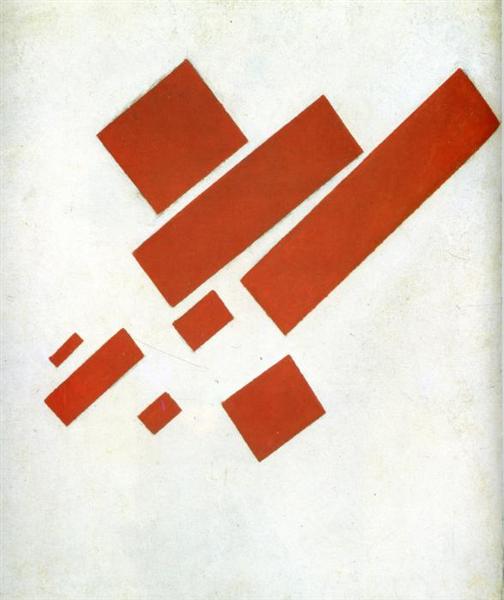Description
Kazimir Malevich, one of the most prominent and visionary artists of the twentieth century, was not only the founder of suprematism, a revolutionary artistic movement, but also a skilled theoretical that transformed the perception of abstract art. His work "suprematism. Two -dimensional self -portrait - 1915" is a prodigious testimony of its radical approach and its devotion to geometric purity.
With a first look at painting, one is immediately confronted with a game of floating geometric shapes on a white background. Visual dynamism created by the asymmetric arrangement of rectangles and squares of colors predominates. Without the presence of recognizable characters or figures, painting becomes an object of pure contemplation, where the shape and color exist regardless of traditional representation.
The use of white as background color is not incidental. Malevich uses it as a non-color that symbolizes infinity, immaterial and colorless, a field where geometric shapes can exist in its purest essence and without distractions. This space emptiness places even more emphasis on the abstract forms that seem to play with each other, creating a dynamic and energetic visual dialogue.
The geometric shapes, mostly rectangular and square, are predominantly colored in tones of red, black and yellow. These colors, applied in solid and gradation blocks, are characteristic of the suprematist style that seeks to eliminate the illusion of depth and volume, favoring the essential two -dimensionality of the canvas. Malevich, through this choice of primary colors, also points to its commitment to simplicity and visual clarity.
The title of the work, "two -dimensional self -portrait," adds an additional layer of meaning. Despite being an abstract work and devoid of facial characteristics or direct human references, Malevich is self -portrait through its artistic language. Here, it is not the countenance that is represented, but the essence of its artistic vision. In this self -portrait, Malevich not only shows his face, but his mind, his thinking and innovation.
Supremeism, as exemplified in this work, represents a decisive break with representational art. Malevich defended that art should transcend the visible and material world to achieve spiritual significance. In "two -dimensional self -portrait", there is a reduction to essence, to basic geometry as a representation of a new artistic world.
Finally, it is pertinent to place this work within the context of suprematism, one of the most influential movements of the Russian avant -garde. Malevich, together with contemporary artists such as the Lissitzky and Liubov Popova, were looking for an art that reflected the new realities of a world in rapid transformation. Through their geometric compositions and their commitment to pure abstraction, they challenged the conventional notions of art and opened paths towards new forms of visual expression.
In "suprematism. Two -dimensional self -portrait - 1915", Malevich not only proclaims its artistic individuality but also a new aesthetic paradigm. The work is erected as a visual manifesto of suprematism, a celebration of pure geometry and color as an end in themselves, and a self -portrait not of man, but of the artist and his vision of art.
KUADROS ©, a famous paint on your wall.
Hand-made oil painting reproductions, with the quality of professional artists and the distinctive seal of KUADROS ©.
Art reproduction service with satisfaction guarantee. If you are not completely satisfied with the replica of your painting, we refund your money 100%.

